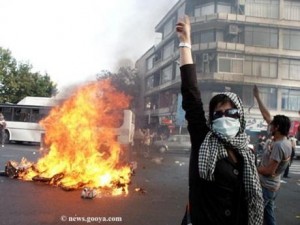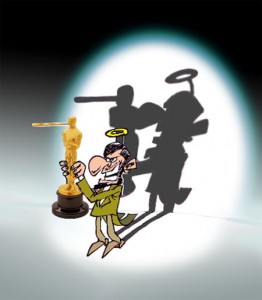Tuesday
Mar302010
Iraq: What Do Latest Post-Election Power Plays Indicate? (Cole)
 Tuesday, March 30, 2010 at 8:47
Tuesday, March 30, 2010 at 8:47  Juan Cole cuts through the confusion to offer the latest developments in the post-election struggle to lead Iraq. Many useful points here, including:
Juan Cole cuts through the confusion to offer the latest developments in the post-election struggle to lead Iraq. Many useful points here, including:1. No individual, party, or list "won" the 7 March election, since no one has even one-third of the Parliamentary seats. The battle is now to form a working coalition amongst the various parties.
2. While these maneovures include meetings between Iraqi political actors in Tehran, this does not mean that Tehran will control or dominate any emerging Iraqi Government.
3. And a point made through absence in this account: although the US has an interest in this contest, there is little sign of the Americans in these latest moves.
The Justice and Accountability Commission (formerly the Debaathification Commission), headed by Ahmad Chalabi, is moving to disqualify 6 elected candidates in the 7 March election for their ties to the banned Baath Party of Saddam Hussein. Three of those to be banned are from the Iraqiya list of [former Prime Minister] Iyad Allawi, which would reduce his seat total from 91 to 88, making his list second in number of seats after Prime Minister Nuri al-Maliki's State of Law coalition, which has 89 seats.
The move, by commission head Ahmad Chalabi (himself an elected MP on the fundamentalist Shiite list, the Iraqi National Alliance), will cause a lot of anger among Sunni Arabs, the main backers of Allawi's list, along with secular middle class urban Shiites.
Al-Hayat writing in Arabic reports that commission official Ali al-Lami let it slip that one of those to be disqualified is Hamdi Najm, leader of the National Dialogue Front in Diyala Province, who is currently in prison on terrorism charges. His party forms part of the Iraqiya list of Iyad Allawi. The disqualifications will be taken to court. However, the courts sided with the Justice and Accountability Commission when it excluded candidates on these grounds in the lead-up to the election, so that avenue does not appear very promising.
But the move is not decisive in deciding the next prime minister, because who can form a government depends not on who has a plurality but on who can put together a governing coalition. It is true that the constitution requires the president to ask the leader of the single largest bloc to form a government. But if that person cannot, then another party leader would get the chance. The best analogy for Iraqi politics at the moment is Israel or Lebanon. In the 2009 parliamentary elections in Israel, Tzipi Livni's Kadima gained 28 seats and Binyamin Netanyahu's Likud only got 27. But you will note that Netanyahu is prime minister, because Shas, Yisrael Beitenu and others preferred to ally with him rather than with Ms. Livni.
I admit to a good deal of frustration with the corporate media in the United States that keeps talking about Iyad Allawi "winning" the Iraqi parliamentary elections. It just is not true. Apparently even some well informed and intelligence Americans can't understand the difference between achieving a slight plurality and winning a parliamentary election.
You need 163 seats to have a majority in the 325-member Iraqi parliament, so neither 91 nor 89 is a "win." Rather, 163 is a win. Allawi did not win and has not won and probably won't win.
The reason is that it is difficult to see how he gets to 163. He needs 72 more seats (or maybe 75 if the disqualifications go through). It is easier for al-Maliki's list, if not al-Maliki himself, to get to 163 seats than it is for Allawi, since the fundamentalist Shiites have 70 seats and they under normal circumstances will find it easier to ally with Maliki's Islamic Mission Party (Da'wa) than with the secular Arab nationalists and Sunnis that back Allawi.
Al-Hayat reports in Arabic that 'informed sources' told its reporters that Ali al-Adib, a leader of al-Maliki's State of Law coalition, recently met Muqtada al-Sadr in Qom, Iran, though they have not yet closed a deal. Al-Sadr has 38 seats in parliament and his bloc is the largest single group of seats in the Shiite fundamentalist Iraqi National Alliance, which has 70 seats. Then, al-Maliki is said to have returned to Baghdad from Tehran, accompanied by al-Adib and Abdul Hamid al-Zuhairi (both from the State of Law list) and Jalal al-Din al-Saghir and Hadi al-Amiri of the Islamic Supreme Council of Iraq.
Al-Maliki is said to have been among a big party of Iraqi officials in Tehran the day before yesterday. They went there, al-Hayat said, because there was too much danger of being listened in on in Iraq. Presumably what is actually being asserted here is that the US has sophisticated signals intelligence and has widely tapped phones, so that in Baghdad any attempt at coalition-formation would be immediately picked up by US intelligence. Since the US is widely thought to be backing Allawi's secular Iraqiya list, it would be undesirable from al-Maliki's point of view for them to overhear his negotiations with other lists. Thus, they went off to Iran.
Al-Hayat's source says that Muqtada al-Sadr demonstrated flexibility, and demanded in return for dropping his objection to al-Maliki the release of all prisoners from his movement, and undertakings that al-Maliki would not attempt to rule single-handedly. He also wanted an agreement that al-Maliki would be fired if he attempted to overstep the decided-up course of action of the party. A Sadrist leader, Qusay Suhail, refused to comment on the Iran story, but did allow as how the Sadrists had met with representatives of al-Maliki's State of Law. The source said that so far in the negotiations the Kurdistan Alliance and the Sadr Movement have declined to put forward an alternative candidate for prime minister. So far al-Maliki is the only candidate from the Shiite parties, "and we did not sense any opposition to him." In contrast, cleric Jalal al-Din Saghir of the Islamic Supreme Council of Iraq insisted that ISCI would definitely put forward a prime ministerial candidate. (ISCI is actually too small to follow through on Saghir's bluster.)
 Scott Lucas |
Scott Lucas |  1 Comment |
1 Comment | tagged  Abdul Hamid al-Zuhairi,
Abdul Hamid al-Zuhairi,  Ahmad Chalabi,
Ahmad Chalabi,  Al-Hayat,
Al-Hayat,  Ali al-Adib,
Ali al-Adib,  Ali al-Lami,
Ali al-Lami,  Ayad Allawi,
Ayad Allawi,  Benjamin Netanyahu,
Benjamin Netanyahu,  Dawa,
Dawa,  Hadi al-Amiri,
Hadi al-Amiri,  Iran,
Iran,  Iraqi National Alliance,
Iraqi National Alliance,  Iraqqiya,
Iraqqiya,  Islamic Supreme Council of Iraq,
Islamic Supreme Council of Iraq,  Israel,
Israel,  Juan Cole,
Juan Cole,  Justice and Accountability Commission,
Justice and Accountability Commission,  Kadima,
Kadima,  Likud,
Likud,  Moqtada al-Sadr,
Moqtada al-Sadr,  Nouri al-Maliki,
Nouri al-Maliki,  Qusay Suhail,
Qusay Suhail,  Shas,
Shas,  State of Law List,
State of Law List,  Tzipi Livni,
Tzipi Livni,  Yisrael Beitenu,
Yisrael Beitenu,  and Jalal al-Din al-Saghir in
and Jalal al-Din al-Saghir in  Iraq
Iraq
 Abdul Hamid al-Zuhairi,
Abdul Hamid al-Zuhairi,  Ahmad Chalabi,
Ahmad Chalabi,  Al-Hayat,
Al-Hayat,  Ali al-Adib,
Ali al-Adib,  Ali al-Lami,
Ali al-Lami,  Ayad Allawi,
Ayad Allawi,  Benjamin Netanyahu,
Benjamin Netanyahu,  Dawa,
Dawa,  Hadi al-Amiri,
Hadi al-Amiri,  Iran,
Iran,  Iraqi National Alliance,
Iraqi National Alliance,  Iraqqiya,
Iraqqiya,  Islamic Supreme Council of Iraq,
Islamic Supreme Council of Iraq,  Israel,
Israel,  Juan Cole,
Juan Cole,  Justice and Accountability Commission,
Justice and Accountability Commission,  Kadima,
Kadima,  Likud,
Likud,  Moqtada al-Sadr,
Moqtada al-Sadr,  Nouri al-Maliki,
Nouri al-Maliki,  Qusay Suhail,
Qusay Suhail,  Shas,
Shas,  State of Law List,
State of Law List,  Tzipi Livni,
Tzipi Livni,  Yisrael Beitenu,
Yisrael Beitenu,  and Jalal al-Din al-Saghir in
and Jalal al-Din al-Saghir in  Iraq
Iraq 

